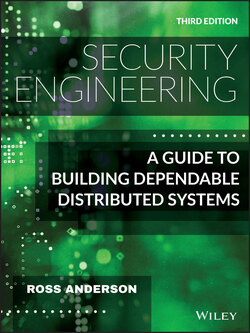Читать книгу Security Engineering - Ross Anderson - Страница 88
3.3.4 Opsec
ОглавлениеGetting your staff to resist attempts by outsiders to inveigle them into revealing secrets, whether over the phone or online, is known in military circles as operational security or opsec. Protecting really valuable secrets, such as unpublished financial data, not-yet-patented industrial research and military plans, depends on limiting the number of people with access, and also on doctrines about what may be discussed with whom and how. It's not enough for rules to exist; you have to train the staff who have access, explain the reasons behind the rules, and embed them socially in the organisation. In our medical privacy case, we educated health service staff about pretext calls and set up a strict callback policy: they would not discuss medical records on the phone unless they had called a number they had got from the health service internal phone book rather than from a caller. Once the staff have detected and defeated a few false-pretext calls, they talk about it and the message gets embedded in the way everybody works.
Another example comes from a large Silicon Valley service firm, which suffered intrusion attempts when outsiders tailgated staff into buildings on campus. Stopping this with airport-style ID checks, or even card-activated turnstiles, would have changed the ambience and clashed with the culture. The solution was to create and embed a social rule that when someone holds open a building door for you, you show them your badge. The critical factor, as with the bogus phone calls, is social embedding rather than just training. Often the hardest people to educate are the most senior; in my own experience in banking, the people you couldn't train were those who were paid more than you, such as traders in the dealing rooms. The service firm in question did better, as its CEO repeatedly stressed the need to stop tailgating at all-hands meetings.
Some opsec measures are common sense, such as not throwing sensitive papers in the trash, or leaving them on desks overnight. (One bank at which I worked had the cleaners move all such papers to the departmental manager's desk.) Less obvious is the need to train the people you trust. A leak of embarrassing emails that appeared to come from the office of UK Prime Minister Tony Blair and was initially blamed on ‘hackers’ turned out to have been fished out of the trash at his personal pollster's home by a private detective [1210].
People operate systems however they have to, and this usually means breaking some of the rules in order to get their work done. Research shows that company staff have only so much compliance budget, that is, they're only prepared to put so many hours a year into tasks that are not obviously helping them achieve their goals [197]. You need to figure out what this budget is, and use it wisely. If there's some information you don't want your staff to be tricked into disclosing, it's safer to design systems so that they just can't disclose it, or at least so that disclosures involve talking to other staff members or jumping through other hoops.
But what about a firm's customers? There is a lot of scope for phishermen to simply order bank customers to reveal their security data, and this happens at scale, against both retail and business customers. There are also the many small scams that customers try on when they find vulnerabilities in your business processes. I'll discuss both types of fraud further in the chapter on banking and bookkeeping.
